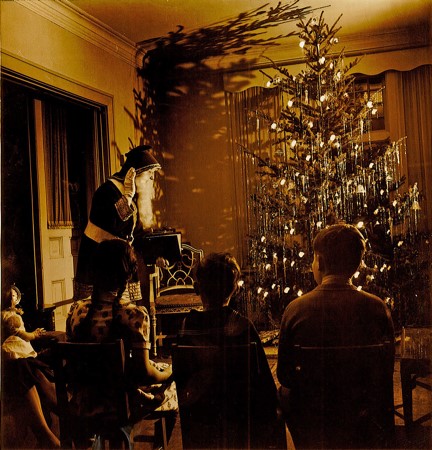Sunday December 24, 2017
December 24, 2016
This photo was taken, probably by my Dad, in 1946. Dr. Redeman, a family friend, was Santa. He visited the homes of parents with children on Christmas Eve in our small town. Three of us four children sit in little chairs, adults behind us, waiting for Santa’s silver chimes outside our front door. Midge, the baby, sits on Mom’s lap on the left. Santa came in and took his black book out of its pouch. He read to us from the gospel of Luke and talked with us about the coming of Jesus into the world. The photo captures our stillness. our attention fixed on this mysterious person. How did Dr. Redemon move us to stillness? Perhaps by the depth of his voice, and its cadence; perhaps by the way he moved, a solemn dancer, with no sign of hurry as he and his Eskimo partner took presents out of large cloth bags, read our names, and placed each one under the tree.
Whoever took the picture captured my attention. The lighting takes me first to Santa’s face and beard and to his hand raised in a good-bye blessing; his poise, mid gesture, makes the entire photo hold its breath. The children show how focused we felt that night, absorbed with wonder. Dr. R taught us that sacred mystery is story telling with no hint of hurrying. All my life since, the pace of my life helps me recognize when I have found the grace to pay attention and not to interrupt.
All of us are better when our life’s pace makes us as still as the children in this 1946 photo. Writing about a moment from childhood makes me grateful for the “Work Day/Hard Times” poetry list. When I write, imagining all of you who read fills me with gratitude and wonder.
love,
john st sj
Addendum # 1, Lori Glenn:
In response to yesterday’s “O Emmanuel’ post, Lori Glenn, a member of our McAuley School of Nursing faculty, wrote me. That’s not unusual; in the 4.4 years since the Work Day/Hard Time list began, we’ve received 2876 comments. Lori wrote from a hospital in Flint MI where, in her other health-care job,’ she wove her reading of the Tagore’s Gitanjali # 1 with her keeping watch, as a nurse midwife, with mothers giving birth in Flint, MI.
About Gitanjali # 1
At times we are sent messages from God that support our work and enhance our appreciation of it. In addition to teaching nursing, I also am a nurse midwife in the troubled city of Flint. As I sit and read the first poem, I am awaiting the arrival of the baby boy at the hospital. This beautiful poem speaks of fresh life, being eternally new, breathing, touch, and hands–perfectly relevant for my work today. I am work at the hospital that is at the forefront of the lead contamination crisis and witness the tremendous stress this has put on Flint’s people. Yet there is perseverance of these people and the kindness of strangers responding to their need that gives me hope.
For today, I am able to put aside all the stress and worry about the water crisis, the political state of the world, and my own Christmas, and replace it with the anticipation of the purest joy of all — a baby’s birth. How fitting this poem is for me on this fine day. Thanks for the inspiration!
Merry Christmas!
Lori Glenn DNPc MS RN CNM
Assistant Professor University of Detroit Mercy
McAuley School of Nursing
Addendum # 2 Dr. Rademan:
It turns out my home-town paper ran a short article, by Larry Ebsch, this year about Dr. Redeman, seen above in the 1943 photo. Here are couple quotes:
“While all Santa’s are special, Dr. Redeman, a dentist, was the star Santa of his era. His love affair with the Christmas season began in the Northern Marinette County community of Amberg while visiting children of relatives and friends in his Santa Claus suit. He expanded his performance in 1937 with visits to 41 families dressed in a special fur trimmed costume. . . announcing his coming by ringing bells . . . the colorful yard decorations attracted national attention during the Great Depression years of the 1930’s.

